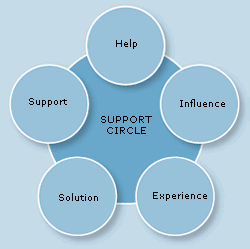If stress is an inherent part of your job, you can
take steps to defend yourself against its effects. There are support
networks that you can call upon, and ways of adjusting your lifestyle to
maximize your resilience.
Look for Help
When you are under
intense stress, it is very natural to withdraw from the world and
concentrate exclusively on solving the problem that is causing the
stress. Sometimes this is a useful and appropriate reaction, but often
it is not, especially as your projects become larger and more complex.
One person working on his own simply cannot achieve tasks that are
greater than a certain size. Similarly, many stressful situations cannot
be resolved without looking for and getting the help of other people.
Use Support Networks
NOTE
Help will usually arrive when it’s sent for
We all have networks of
people who can help us to solve problems. In the context of your work,
your professional networks include relationships with a range of people
within your organization, including your manager, mentors, colleagues,
your team, and the organizational support services. External people who
offer support include professional contacts, clients, suppliers, trade
associations, professional, state, and independent organizations (some
of which may exist solely to help you to solve the problem you face).
Outside work, your social networks obviously include your friends,
clubs, social organizations, and, importantly, your close and extended
family. Don’t be afraid to ask for appropriate help where it is
available. A request for help shows that you are sufficiently in control
of the situation to realize that it’s more than you can cope with on
your own.
Call for Assistance
People in your social and professional networks can give help and support in a wide variety of ways.
Physical assistance – This can be financial or direct help, or the provision of useful resources.
Political assistance
– Other people can use their influence and personal networks on your
behalf to help with the situation, for example, by persuading other
people to move deadlines, change what they are doing, or help directly.
Information
– People may have information that helps in the situation or solves the
problem, or they may have personal experience that can help you.
Problem solving
– These people may be able to help you to think through how to solve
the problem. They may have solved the problem before or seen it solved
elsewhere. Just explaining a problem clearly to someone else can bring
it into focus so that the solution is obvious. People in your network
may have problem-solving skills that you do not, or may just be
sufficiently fresh and unstressed to see good alternatives.
Reassurance
– Friends and colleagues can give emotional support and reassurance
when you may be starting to doubt yourself. They can help you to put
problems into context or can help you to find solace elsewhere. Others
can simply cheer you up when you are feeling down.
Depending on the type of difficulty you are having, you may want to
turn to one or more circles in your support network to take some of the
pressure off when you are feeling stressed.

Rest and Relax
When people who are
highly committed to their work are faced with a stressful situation,
they often respond by working intensely hard to resolve it, cancelling
holidays, and cutting back on sleep and recreation. In the short term,
the negative effects may be minimal and success can be spectacular, but
if this level of work is sustained for a long time there is a risk of
burnout. Relaxation – at the end of a working day and at the end of a
working week – will help you to calm down and allow your stress to
subside.
A Saturday afternoon spent on a hobby will give you enough perspective to refocus on your priorities at work and in life.

Have Some Fun
Doing things that you
enjoy in your leisure time compensates you for the stress you experience
at work, bringing back some balance into life. If you spend all your
working day competing, then a non-competitive sport or hobby is a good
way of reducing long-term stress. Slow physical activities, where there
is little or no pressure for performance, such as sailing, fishing, or
walking, are good for this. Reading, watching television, or socializing
with friends can also be restful. By offsetting the unpleasant and
stressful events in your life against plenty of good, enjoyable, and
relaxing events, you will make your life more tolerable and reduce the
risk of burnout.
Case Study: Keeping the Balance
Jean was feeling ground
down and irritable. His work was so intensive that he found himself
cancelling holidays and working long hours to stay on top of his
workload. He was always tired, increasingly irritable, and was not
enjoying his work. His relationships at work and home were suffering,
and life was increasingly gruelling.
Jean knew that this couldn’t
continue. He booked a two-week holiday at a remote beach club and said
that he would be out of contact while there. He had a great time on
holiday with his partner and the slow, relaxed pace of the resort
ensured that he returned to work recharged and re-energized.
Jean had realized
in time that he was getting into a vicious circle of overwork and
fatigue in which his effectiveness was being diminished by stress.
The pressure of work had been causing him to distance himself from people around him, increasing his stress.
Taking a
break gave him renewed energy and vigour so that he was able to
re-engage with his team and his work and rebalance his workload.
Tip
Take regular holidays – they will help you to reduce
stress and gain some valuable perspective on your working situation.
Get Plenty of Sleep
If you are regularly short
of sleep, your concentration and effectiveness will suffer and your
energy levels decline. This can reduce your control over events and make
an already difficult and stressful situation worse. If you have become
used to being tired all the time, you will be amazed at how sharp and
energetic you will feel once you start sleeping normally. Give yourself
at least an hour to wind down before going to bed. Take a warm bath
while listening to soothing music, or watch something amusing on TV.
Make sure that your
bedroom is restful, calming, well-ventilated, and cool. It should be
comfortable and without any distractions or irritations. Avoid using
your bedroom as a workplace – this will create an association with the
stressful and difficult situations that you need to forget.
Take Exercise
As well as improving
your health and reducing the stress caused by unfitness, frequent
exercise also relaxes the muscles and helps you to sleep. There are
other positive benefits, too.
Exercise improves blood flow to the brain, bringing additional
sugars and oxygen that may be needed when you are actively engaged in
thinking intensely.
It speeds the flow of blood through your brain, removing waste products faster and improving brain function.
It can cause the release of chemicals called endorphins into your
blood stream. These give you a feeling of happiness, and positively
affect your overall wellbeing.
Physically fit people have less extreme physiological responses
when under pressure than those who are unfit, making them better able to
handle the long-term effects of stress.
Seek the advice of a trained medical professional before engaging actively in any type of exercise programme.
Techniques to Practise
When you are stressed and anxious, you may find it
difficult to get to sleep as thoughts keep on whizzing through your
head.
Stop doing mentally
demanding work several hours before coming to bed. Give your brain time
to calm down before you try to sleep.
Try reading a calming, undemanding book for a few minutes to relax
your body, tire your eyes, and help you to forget about the things that
are worrying you.
Write down any persistent thoughts and worries in a notebook and
then put them out of your mind. Review them in the morning and take
action if appropriate.
Keep the same bedtime. Let your body and mind get used to a predictable routine.
Cut back on caffeine, alcohol, and nicotine, all of which can cause you to sleep badly.
Watch Your Diet
You need to keep up your
energy levels when you’re feeling stressed. What you eat is extremely
important. Cut down on salt and sugar and eat unrefined carbohydrates
such as wholemeal bread and oats. Eat plenty of fresh fruit and
vegetables, and cut down on your consumption of caffeine and alcohol.
Stress depletes the body of essential B vitamins so make sure to include
eggs, poultry, pulses, nuts, and seeds in your diet. It can be worth
taking a multivitamin and mineral supplement.
Take Time to Eat
Usually, when we’re under a
lot of pressure, the first casualty of a normal life is a proper
mealtime. We tend to eat on the run, picking up whatever snack we can
and eating it at the desk or in the car while en route to the next
appointment. It’s important to take time to sit down while eating and to
eat slowly. If you eat too quickly you won’t chew properly and will
probably eat too much.